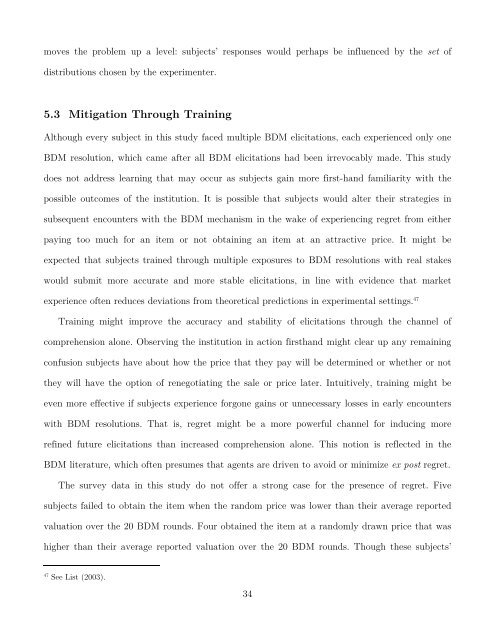Testing Distributional Dependence in the Becker-DeGroot-Marschak ...
Testing Distributional Dependence in the Becker-DeGroot-Marschak ...
Testing Distributional Dependence in the Becker-DeGroot-Marschak ...
You also want an ePaper? Increase the reach of your titles
YUMPU automatically turns print PDFs into web optimized ePapers that Google loves.
moves <strong>the</strong> problem up a level: subjects’ responses would perhaps be <strong>in</strong>fluenced by <strong>the</strong> set of<br />
distributions chosen by <strong>the</strong> experimenter.<br />
5.3 Mitigation Through Tra<strong>in</strong><strong>in</strong>g<br />
Although every subject <strong>in</strong> this study faced multiple BDM elicitations, each experienced only one<br />
BDM resolution, which came after all BDM elicitations had been irrevocably made. This study<br />
does not address learn<strong>in</strong>g that may occur as subjects ga<strong>in</strong> more first-hand familiarity with <strong>the</strong><br />
possible outcomes of <strong>the</strong> <strong>in</strong>stitution. It is possible that subjects would alter <strong>the</strong>ir strategies <strong>in</strong><br />
subsequent encounters with <strong>the</strong> BDM mechanism <strong>in</strong> <strong>the</strong> wake of experienc<strong>in</strong>g regret from ei<strong>the</strong>r<br />
pay<strong>in</strong>g too much for an item or not obta<strong>in</strong><strong>in</strong>g an item at an attractive price. It might be<br />
expected that subjects tra<strong>in</strong>ed through multiple exposures to BDM resolutions with real stakes<br />
would submit more accurate and more stable elicitations, <strong>in</strong> l<strong>in</strong>e with evidence that market<br />
experience often reduces deviations from <strong>the</strong>oretical predictions <strong>in</strong> experimental sett<strong>in</strong>gs. 47<br />
Tra<strong>in</strong><strong>in</strong>g might improve <strong>the</strong> accuracy and stability of elicitations through <strong>the</strong> channel of<br />
comprehension alone. Observ<strong>in</strong>g <strong>the</strong> <strong>in</strong>stitution <strong>in</strong> action firsthand might clear up any rema<strong>in</strong><strong>in</strong>g<br />
confusion subjects have about how <strong>the</strong> price that <strong>the</strong>y pay will be determ<strong>in</strong>ed or whe<strong>the</strong>r or not<br />
<strong>the</strong>y will have <strong>the</strong> option of renegotiat<strong>in</strong>g <strong>the</strong> sale or price later. Intuitively, tra<strong>in</strong><strong>in</strong>g might be<br />
even more effective if subjects experience forgone ga<strong>in</strong>s or unnecessary losses <strong>in</strong> early encounters<br />
with BDM resolutions. That is, regret might be a more powerful channel for <strong>in</strong>duc<strong>in</strong>g more<br />
ref<strong>in</strong>ed future elicitations than <strong>in</strong>creased comprehension alone. This notion is reflected <strong>in</strong> <strong>the</strong><br />
BDM literature, which often presumes that agents are driven to avoid or m<strong>in</strong>imize ex post regret.<br />
The survey data <strong>in</strong> this study do not offer a strong case for <strong>the</strong> presence of regret. Five<br />
subjects failed to obta<strong>in</strong> <strong>the</strong> item when <strong>the</strong> random price was lower than <strong>the</strong>ir average reported<br />
valuation over <strong>the</strong> 20 BDM rounds. Four obta<strong>in</strong>ed <strong>the</strong> item at a randomly drawn price that was<br />
higher than <strong>the</strong>ir average reported valuation over <strong>the</strong> 20 BDM rounds. Though <strong>the</strong>se subjects’<br />
47 See List (2003).<br />
34


